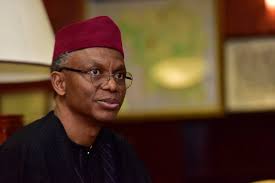The Northern Governor’s Forum (NGF) has convened an emergency meeting scheduled to be held today, with an agenda to discuss issues relating to the Value Added Tax (VAT) that has caused some divisions between states, as well as the the Federal Government. The meeting will be held in Kaduna State, Nigeria hosted by Mallam Nasir El-Rufai and presided over by Simon Lalong of Plateau State, Chairman of the NGF.
“The actual reality is not a very industrious South being milked by a lazy parasitic North as the public debate has been shaped; many states in the South also collect more VAT funds than they contribute”.
This meeting was confirmed on Sunday by the Coordinator of the Northern Governors Forum Secretariat and Secretary to the Plateau State Government, Professor Danladi Atu, who said that the forum would take a position on VAT at Monday’s meeting.
He further stated that on the agenda also includes reaching a conclusion on the expected action of the northern governors on joining the FIRS in its suit against Rivers and Lagos states over the VAT collection and their respective new VAT laws. In Ogun state, a similar bill has passed second reading in the Ogun State House of Assembly and at this pace will likely be passed into law in the state soon.
This meeting is coming after an introspective comment by the Northern Elders Forum (NEF) last week that the current VAT controversy is a challenge to develop their states to be independent of VAT revenue.
Earlier, the Federal Court of Appeal in Abuja had granted the Federal Inland Revenue Service (FIRS) its request for a stay of execution against Rivers and Lagos states. This will allow the FIRS to continue to collect VAT from companies within those states, against the direction of the court judgement granted in favour of Rivers State in August, which empowered the state government to collect VAT and other related taxes.
Before this Judgement, the Lagos State and River States governors have signed their respective VAT laws with Lagos opting for a 6% VAT. Both states contribute over 65% of the entire VAT revenue in Nigeria, but receive less than 30% combined after it is redistributed among states and the FG (which takes 15% of collected VAT).
It can be recalled that on August 9, Justice Stephen Pam of the Federal High Court in Port Harcourt granted the Rivers State government the right to collect VAT, instead of the FIRS, paving the way for state governments to initiate the process to start VAT collection.
Governors Nyesom Wike and Babajide Sanwo-Olu, subsequently assented to the states’ VAT Laws after they were passed by the respective state houses of assembly.
But the FIRS, which was displeased with the development, later approached the Court of Appeal in Abuja with a civil motion seeking a stay of the execution of the judgement granted by the court in Rivers, pending the determination of the case after a similar request was denied by Justice Pam of the Federal High Court Port Harcourt.
Also Read: VAT Earnings Jump 29 percent in Q3 2020
A three-man panel of the appellate court led by Justice Haruna Tsammani then directed all parties to maintain the status quo and refrain from taking action that would give effect to the judgement delivered by Justice Pam, pending the hearing and determination of the instant suit.
In its reaction, the Rivers State government filed an appeal at the Supreme Court to challenge the ruling of the appellate court.
Apart from Lagos and Rivers states, Ogun State has also started the process of passing a bill on VAT in its House of Assembly.
Posturing ad nauseam
The VAT controversy is adding to a long list of controversial issues that have split the country along North versus South lines and raised political tensions. The public debate, including interventions by senior lawyers, have been driven more by political posturing than technical analysis of the law or the practicality of 36 states of the federation having VAT authorities chasing companies for VAT receipts. The actual reality is not a very industrious South being milked by a lazy parasitic North as the public debate has been shaped; many states in the South also collect more VAT funds than they contribute. Governor Omahi, whose state Eboyin would lose revenue if the FIRS ceases to collect VAT, has come out to oppose the position of fellow Southern governors.
The VAT controversy is a deeply political issue. Resorting to court cases or North versus South political meetings is likely to only add to the heat in the polity alongside a long list of issues such as herdsmen versus farmer conflict. If the Federal Government and the Federal Inland Revenue win in the Supreme Court, the verdict would be viciously attacked by the Governors, especially Nyesom Wike of Rivers State, further heightening political division in the country.
Any FIRS victory at the Supreme Court would be widely interpreted as yet another evidence of the North exploiting its political dominance to unfairly further its interest. The Northern Governors’ meeting also unnecessarily contributes to entrenching the North-versus-South political division the VAT debate is promoting. A useful contribution Governor El Rufai and his colleagues would have made is to reach out to Governors in Southern states like Umahi who stand to lose revenue if the Wike-led position wins and negotiate behind the scenes for a compromise. But being Nigerian politicians, they loathe to lose a chance to posture as champions and defenders of their peoples’ interests.
